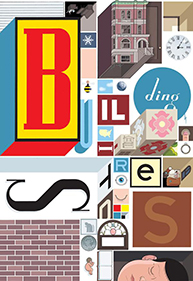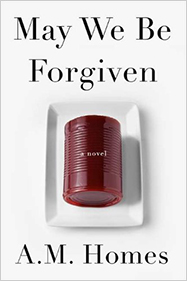by David Abrams
Buy on NOOK »-
March 20, 2013
Quarterfinals
-
Chris Ware
4Building Stories
v.
2May We Be ForgivenA.M. Homes
-
Judged by
Caity Weaver
Physically, these books are opposites. With its stark, symmetrical cover design (a photograph of a can-shaped lump of cranberry sauce on a vast white background), May We Be Forgiven seems determined to convey from the outset that it is not a book but a Book. It’s the kind of book that congratulates you for choosing it. “You could have just reread Bossypants for the third time, but instead you chose me. You and I are Important.” A coworker even asked me if I’d borrowed it from the library—“Uh, I have enough money to buy hardcover books!” I lied—that’s how impressive it looks. I loved being seen reading it in public.
Building Stories, on the other hand, asks the reader to take it on almost in spite of its physical appearance: 14 discrete, eminently loseable storytelling pieces. It takes a patient person to spend hours poring over Chris Ware’s detailed illustrations. It takes an unselfconscious one to crack open The Daily Bee, a full-sized fake newspaper published by bees, in public.
The day before I started Building Stories, my boyfriend was unexpectedly admitted to the hospital, so I spent most of my night in an emergency room. I began reading it the next day on the subway, having crammed a couple of the smaller books into my overnight bag along with a change of clothes. As a single, six-pound box, Building Stories is unwieldy to transport. Separately, though, it’s like carrying around a single book, one chapter at a time. The books (and what should have been an anxiety-filled, hour-long commute) flew by.
The intriguing thing about Building Stories is that its plot isn’t—at least not on the surface.
The main character of the narrative (though there are many, including a bipolar bee and an old stone building) is an unremarkable young woman whose life we observe through Ware’s detailed (and often impractically sized) artifacts. We view all the rooms in her Chicago brownstone simultaneously, as we would a dollhouse. We view her from above, like a spider on her ceiling, and read her through the thoughts of other characters. We travel backwards into her past and ahead into her future. Her trajectory is not exceptional (marriage and baby), yet it is incredibly compelling. The drawings are intimate; the loneliness is poetic.
May We Be Forgiven is the story of Harold Silver, a childless professor abruptly called upon to step into his younger brother’s shoes (figuratively as an ersatz father, literally when he sets up camp in his brother’s home and begins wearing his clothes, a detail that always struck me as odd) after George Silver, a successful TV executive, is removed to various rehabs.
The first half of the book is rocked by a series of horrors. George kills three people within one week (one with a lamp, two with a car); Harry begins soliciting sex from internet strangers and is briefly taken captive by a pair of creepy preteens. Even the monotonies of everyday life are described in a language that is gratifyingly visceral. (Of Thanksgiving dinner: “The turkey, an ‘heirloom bird,’ whatever that means, had been rubbed, relaxed, herbed into submission, into thinking it wasn’t so bad to be decapitated, to be stuffed up the ass with breadcrumbs and cranberries in some annual rite.”)
The second half is marked by a jolting calm. As triumph follows triumph (Harry Eat, Pray, Loves with his niece and nephew in South Africa; Harry rejuvenates his career with the help of a kindhearted online sex partner), I steeled myself for a return to the chaos and bite of the earlier pages. Would the money run out? Would George break out of his experimental, Hunger Games-esque prison colony and go on a killing spree? Unlike the characters, I was prepared for their swift and sudden downfall.
How disappointing, then, that it never came. In its second act, the novel builds and builds to a deafening crescendo of bliss, then never stops. It was like starting a dinner with a big, bloody steak, and finishing with a light garden salad.
At the heart of both these stories is an outsider peering in through the windows of a life that’s not his own. In May We Be Forgiven, the observer is the novel’s anxious protagonist. In Building Stories, the Peeping Tom is us. The books are made and broken on the compelling nature of the world the outsider looks in on.
Though I appreciated its glut of fun facts about Richard Nixon (ask me about his desk—I’ve got a great fact about it now) the language of May We Be Forgiven at times felt overly crafted. The novel’s young children speak like constructions of children dropped into a book just to deliver lines that Mean Something. (“My mother only talks to her BlackBerry,” quoth one nine-year-old. Classic kid stuff.) Even worse, there are some pretty terrible anatomical euphemisms on display: A neighbor’s vagina is remembered as a “dark mother-cave gaping open, like a raw wound.”
The characters and situations of Building Stories felt much more realistic, cartoon renderings though they were. Its lines provided a much smoother read—at least in a literary sense. Physically, it was a nightmare. Although a complicated diagram printed on the back of the box suggests an order for moving through the materials, my eyes glazed over within seconds as I tried to make sense of its labyrinthine arrows. I even had difficulty navigating within the pieces themselves.
While both novels had their shortcomings, Building Stories’ were purely superficial. In May We Be Forgiven, it’s the characters who felt that way. The former transforms the reader into an omniscient spy; the latter ultimately doesn’t give us much worth spying on. The winner, then, is unquestionably Building Stories, for its ability to convey more humor, tragedy, and emotion in a comic about a bee getting trapped in a soda can than an entire novel was able to with storylines about murder, money, and suburban swingers nights.
Match Commentary
By Kevin Guilfoile & John Warner
Kevin: There was this big Canadian graduate student who taught my Freshman Seminar class in college. I don’t remember his name, but he chain-smoked in class and had a lumberjack beard that covered his neck like red clover and disappeared under his shirt collar. He wore a long fur coat in winter and held regular office hours at night, in a bar that all his students were too young to go into. One day he showed up to class so hungover that he walked right to the window and puked all over four stories of brick. He liked to call people the c-word in French.
I remember him telling me about his doctoral thesis. I don’t remember what it was about (except that it might have been Foucault-related) but he said he was going to defend it by giving his advisors one of those lottery barrels with numbered balls inside, and they would spin the barrel and pull out a ball and then he would read the corresponding page number from his paper. Then they would pull out another ball and he would read that page, and so on. “Or maybe,” he said, “I’ll just throw the whole manuscript up in the air and walk around the room, picking up pages and reading them at random.”
I told him that sounded like a terrible idea, which delighted him.
Building Stories reminded me of that guy’s thesis, except for the part about it being a bad idea. As Judge Weaver says, there’s a guide on the box suggesting the proper order to read it, but it’s not entirely clear what you’re supposed to do with it. And anyway, it’s hard to stop your meathooks from rifling through the box and reading the first comic that connects with you. You’re more likely to start it in the middle than you are at the beginning, if there is a beginning, really. But it doesn’t matter because when you get to the bottom of the box, you’re probably going to dump all the booklets back in and reread parts of them, just to put so many of those silently profound frames in a new context. It’s like an endless story that loops back on itself again and again, getting better all the time.
Take the bee stuff. Before you read The Daily Bee did you even notice the building had a basement window? Now that you’ve read The Daily Bee can you take eyes off the basement window?
John: Can I admit that I didn’t even see the suggested order of reading on the box? I’m wondering now how it might’ve impacted my opinion of the project if I’d followed the suggestions. Maybe quite a bit. Maybe not at all. In a way, Chris Ware is working in his own medium. There were some questions regarding the appropriateness of including Building Stories in the Tournament. Judge Weaver sort of capitulates to our categorization of it and calls it a “novel,” but isn’t it more novel than a novel?
It has me thinking about stories and how we tell them. I think about this a lot. Just about all the fiction I write has this question imbedded in it at a meta-level. I’m usually thinking about it in the context of a book—read linearly—but technology provides more and more ways to skin this particular cat.
Advanced can be as simple as printing The Sound and the Fury in color, as Faulkner apparently originally intended it.
Or maybe it’s something like the project undertaken by my former McSweeney’s colleagues, Chris Ying, Eli Horowitz, and Russell Quinn, who made (as far as I know) the first storytelling app, The Silent History, which involves a serialized work of fiction enhanced by “field reports” incorporating audience participation matched with a smartphone’s geolocating abilities.
Though I think The Silent History is very cool, I’m also someone who doesn’t really think the book needs to be improved upon, and that these other things are their own forms. In the opening-round reader comments on Building Stories, there was some question as to whether or not it belonged in the Tournament. I share those questions, even as I’m glad that it’s here and not at all disappointed that we get another round to talk about it some more.
Kevin: Based on the comments after May We Be Forgiven’s opening-round victory over Billy Lynn’s Long Halftime Walk, I’m not surprised it lost this week. Certainly it’s a polarizing book. (Of course, Billy Lynn took its share of lumps from readers, as well.) I don’t think we’ve addressed the commenting yet this year, but it is worth repeating that the year we allowed comments on each match (whichever year that was) was a transformational one for the Rooster. That is the moment when this thing went from a big goof to one of the best conversations about literature anywhere. The level of intelligence, the diversity of opinion, and the careful reading that is on display by the folks who follow the ToB is terribly exciting and it gets better every year. We’ll say it again, but thank you, not only to those who participate in the discussion, but also to those who refresh their browsers all day, trying to follow along. I’m going to miss May We Be Forgiven in this tourney (even if I would have chosen Building Stories, as well) but I’m a better reader for knowing why some people won’t.
John: Some of the haterade poured on May We Be Forgiven in the opening round had me feeling a little funky about liking it as much as I did. I considered jumping into the fray myself, but decided to stay safe and cozy in the booth, where there’s some plexiglass protecting me from the slings and arrows.
The criticisms of the “white savior” and “magical negro” tropes are tough to refute, except that I think they don’t take in the frequency at which the novel is pitched. I just feel a “knowingness” to Homes’s work (all of her work really), and I think I trust that there’s some significant measure of irony with which she employs these things. I’m going to stand by my admiration, even as I duck and cover.
And I’m not a fan of the argument that readers “miss” books. While an even cursory perusal of the one-star reviews on Amazon will show that in some cases, readers are maybe not equipped to grok a certain book, I think the more common phenomenon is books and readers simply missing each other. Some of us are just tuned to different frequencies, as you and I found out in 2009 when we were both mystified by 2666.
Personally, I’ve pretty much stopped saying that a book is “good” or “bad.” I may think these things, but those classifications are personal and ultimately not particularly helpful to anyone, including myself.
In this sentence from Judge Weaver’s review, I think there’s a clue in how different people respond differently to May We Be Forgiven: “The first half of the book is rocked by a series of horrors.”
Reading this, I realized that I did not experience these events, as relayed in the book as “horrors,” even though they are, objectively, “horrible.” I don’t know why this is, maybe because George’s killings were a cross between tabloid-ish and mundane. Or maybe it’s because Harry doesn’t seem to react to them with horror. I think I didn’t take those acts seriously in the way I do where violence is shown as horrible, like 2010 competitor The Book of Night Women, which is a book that’s seared into my memory for all time.
I’m not surprised that May We Be Forgiven has gone down to defeat. It’s a weird book. I would be surprised to see it doing well in our Zombie poll.
Kevin: I have encountered readers, of course, who I feel have completely missed the point of one or another of my books, but I consider that a fault of mine as much as theirs. Some people are smarter than me, some people are idiots, and others make honest mistakes (I think there are reviewers—both professional and not—who read so many books they sometimes trip up and conflate them), but a novel is a contract between writer and reader. We are lab partners. If the book didn’t hit you in the place I hoped it would, for any reason, we still get the same grade, and you have every right to bitch about me to your friends.
Tomorrow, we have a pair of books each (in its own way) about the search for a missing woman, as Gillian Flynn’s Gone Girl takes on Jess Walter’s Beautiful Ruins. As for May We Be Forgiven, you are an excellent prognosticator. It didn’t have enough votes to catch either The Fault in Our Stars or Arcadia, which remain our Zombie contenders through this match.
























